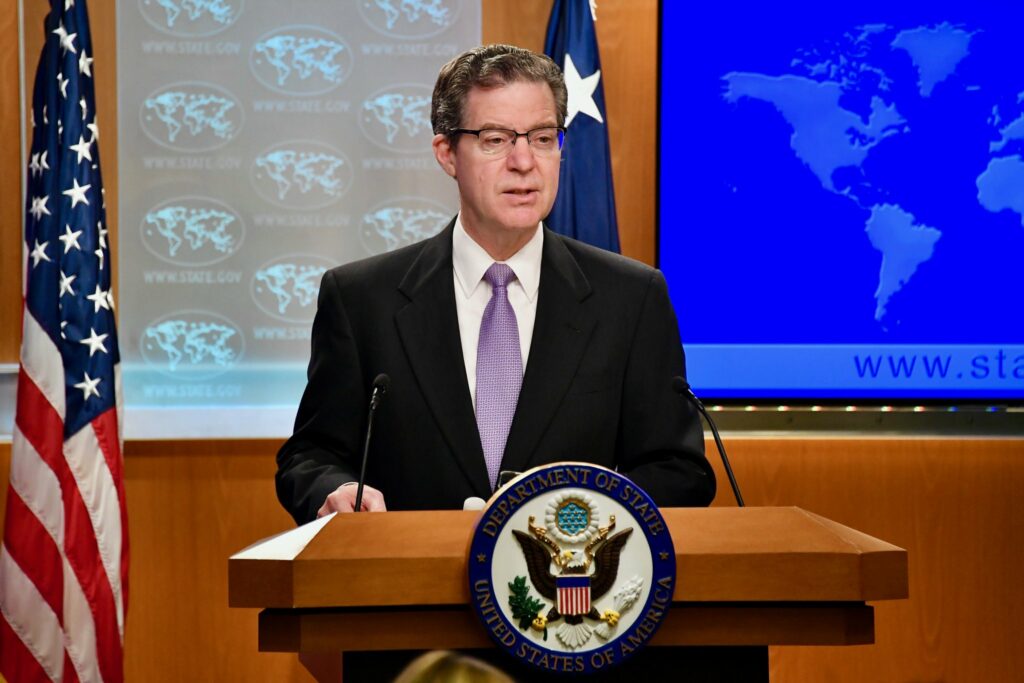Ambassador at Large for International Religious Freedom Samuel Brownback gives an interview on Orthodox Times.
He talks about the chances of reopening the Halki seminary, about Archbishop of America Elpidophoros, encourages the Serbian Orthodox Church and the Montenegro government to discuss, and underlines that the United States support for Ukraine’s sovereignty and territorial integrity is unwavering in the face of Russian aggression.
Interview of Ambassador at Large for International Religious Freedom Samuel Brownback to Efi Efthimiou:
Unfortunately, all too often recently, we receive news of Christian churches or populations being attacked, especially in the Middle East and Africa. What is the situation in Syria today and what can Christian populations expect to improve their level of security?
Religious freedom is a universal human right. Every person around the world, including in the Middle East, should be free to believe or not believe as they see fit.
In many parts of the region, including Syria, religious communities are shrinking in the face of violent extremist threats and societal tensions. In others, such as Iran, repressive government actions are making religious minority communities feel unwelcome. As such, the region risks losing the rich religious pluralism and heritage for which it was once known.
This is, in part, why the International Religious Freedom Alliance was just launched. The Alliance aims to advocate for religious freedom, objecting and opposing, publicly and privately, all abuses or violations of religious freedom around the world, and coordinating resources and participation in the efforts to do so.
What is the most burning issue at present in the Christian world and in Orthodoxy in particular? What effects is it likely to have?
The challenges to religious freedom are global and they affect all faiths, including Christians. Threats to religious freedom anywhere are threats to stability everywhere. The United States, along with our partners, is committed to addressing these challenges head-on.
US government officials have openly expressed their views on the issue of Ukrainian Autocephaly. At the same time, however, they criticize the Russian government for intervening in the internal affairs of another country through pressure exerted by the Moscow Patriarchate. How do you justify this attitude?
The United States takes no position on internal Church affairs, and strongly supports the freedom of members of religious groups to govern themselves according to their beliefs and practice their faith freely without external interference. The United States support for Ukraine’s sovereignty and territorial integrity is unwavering in the face of Russian aggression.
You have recently stated that the USA supports the reopening of the Halki seminary and that it is time for the Turkish government to allow it to happen. Do you think this is possible now, following Turkey’s aggressive attitude towards Greece and Cyprus recently?
This administration and previous administrations have called for the reopening of Halki Seminary on terms acceptable to the Ecumenical Patriarchate. We will continue to urge Turkish officials at the highest levels to reopen the seminary as a symbol of Turkey’s commitment to religious freedom.
Some months ago you visited the Balkan countries as part of your tour and held meetings with the Primates of the Orthodox Churches. The Serbian Orthodox Church is currently in turmoil over the law passed in Montenegro on the legal status of religious communities. What stance will you be taking on this issue?
The United States strongly supports the freedom of members of religious groups to govern themselves according to their beliefs and practice their faith freely without government interference. We are encouraging both sides to engage in dialogue to resolve this issue.
In June 2019, the new Archbishop of America, Elpidophoros, was enthroned. What are the US relations with the Orthodox Church and the Greek Orthodox community in America?
The United States regularly engages with Archbishop Elpidophoros, the Orthodox Church and members of the Greek Orthodox Church; however, my role is focused on religious freedom outside of the U.S.
The first meeting of the International Religious Freedom Alliance in the US took place in early February, with the participation of many states, including Greece, represented by Deputy Foreign Minister Konstantinos Vlasis. How important is for you that this initiative meets a positive response? What is the main purpose of the Alliance?
With more than 80 percent of the world’s population living in countries with high to severe restrictions on religious freedom, the International Religious Freedom Alliance could not be more critical. Threats to religious freedom anywhere threaten stability everywhere. The formation of the Alliance marks the first time in history an international coalition has come together at a national leadership level to push the issue of religious freedom forward around the world. The Alliance aims to advocate for religious freedom, objecting and opposing, publicly and privately, all abuses or violations of religious freedom around the world, and coordinating resources and participation in the efforts to do so.
